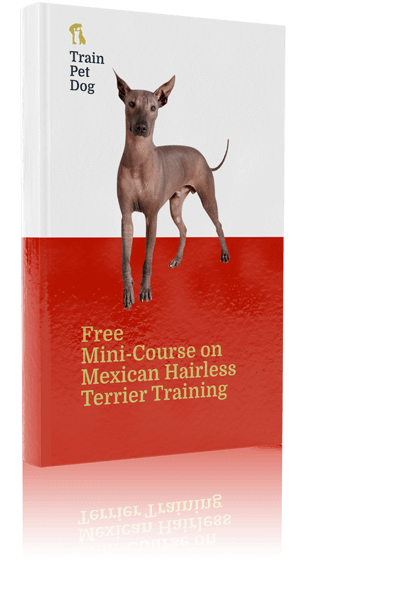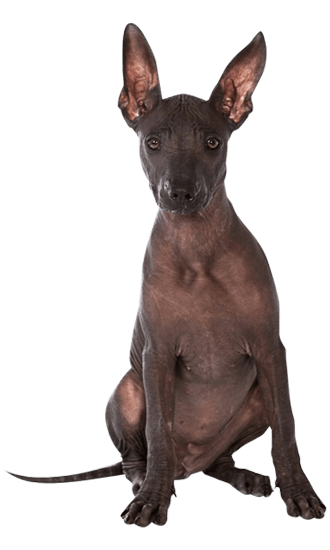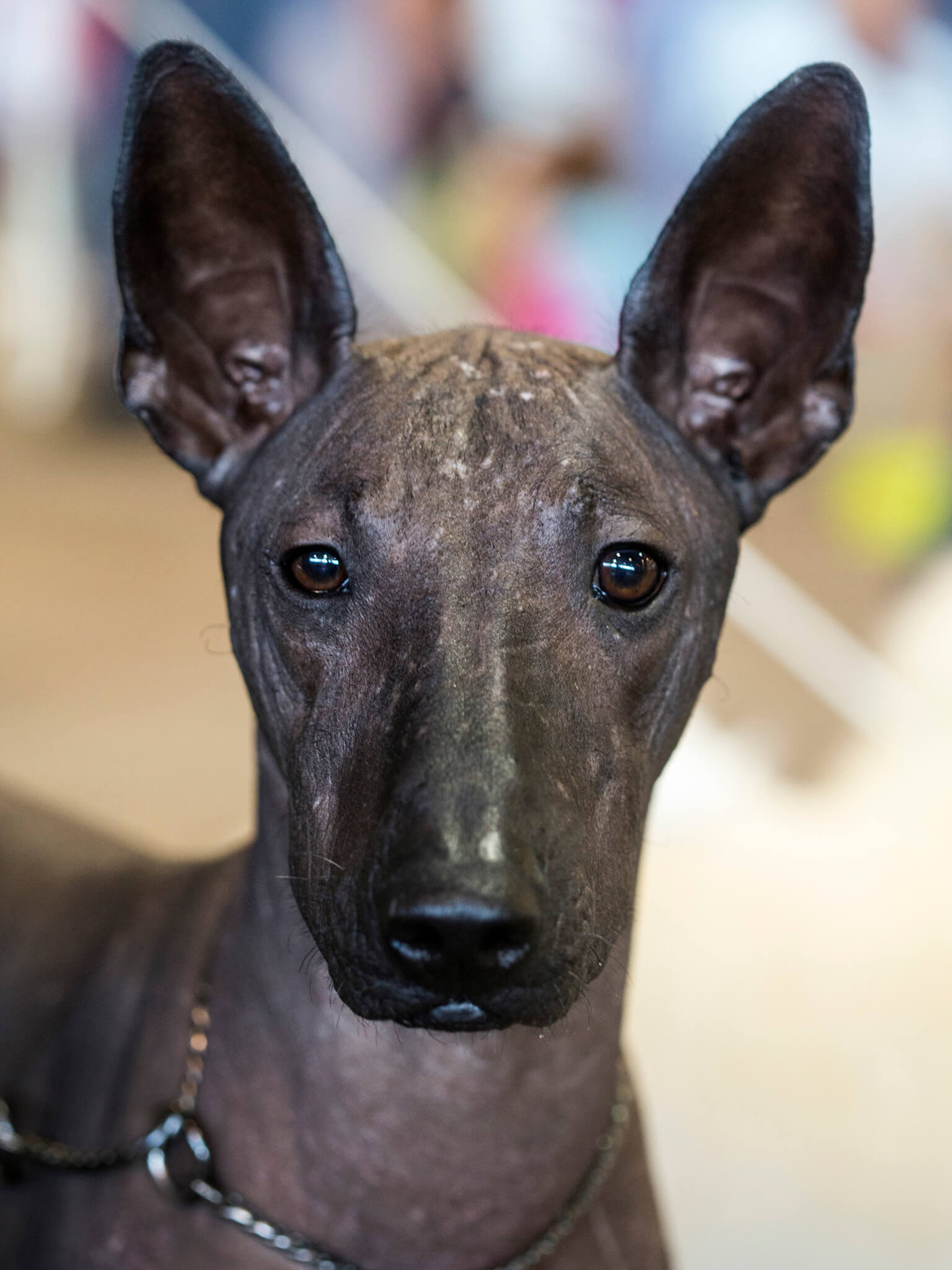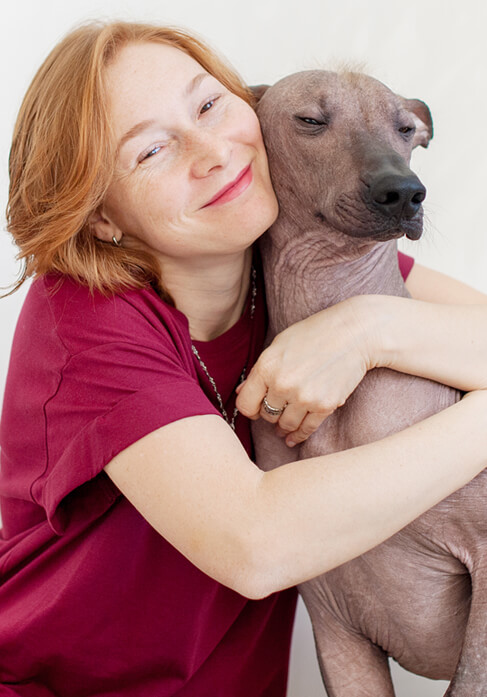Privacy Policy: Your email address is 100% safe.
We don't spam and hate it as much as you do :-) You can also unsubscribe from our mailing list at any time.

Sign Up
Mexican Hairless Terrier: Origin, Personality, Fitness & Health

Country of Origin, History of Mexican Hairless Terriers
The Xolo is one of the oldest breeds, dating back at least 3,000 years. Various artifacts from the tombs of Colima, Mayan, and Aztec Indians of Mexico show the dogs. It is thought that they were taken with ancestors of the Aztecs from Asia to Mexico. They were thought to have curative and mystical powers. Although they were kept as pets, their other uses were more valuable – bedwarmer, sacrificial offering, food, guide to the after-life. In fact, their fame as bedwarmers is known worldwide. Extremely cool nights were known as “three dog nights.” The toasty, warm heat emanating from the dog’s body was known for relieving stomach pain, joint pain, etc.
The Mexican Hairless is seen today through South and Central America. They are becoming increasingly popular again in the United States and United Kingdom. They are non-allergenic and very clean. They make good companions and are used extensively for therapy dogs. They are great obedience and agility dogs.
Mexican Hairless Terrier Tools
Breed Selector Tool - is the Mexican Hairless Terrier the right breed for you?
Is the Mexican Hairless Terrier the right breed for you and your family?
Find out by using our Free Dog Breed Selector Tool
Check Your Mexican Hairless Terrier's Learning Style
Are you aware dogs also have a learning style that can greatly affect their ability to housetrain as well as be trained correctly. Evaluate your Mexican Hairless Terrier's learning style and personality using our free Learning Style tool so that you are better able to provide him with the proper Mexican Hairless Terrier training methods.
Is your Mexican Hairless Terrier dominating over you?
Does your Mexican Hairless Terrier bark unnecessarily? Does your Mexican Hairless Terrier come to you when you call? Download a FREE Report on Dog Dominance for you and your Mexican Hairless Terrier and learn how to control your dog.
Do you make these mistakes with your Mexican Hairless Terrier?
Are you inadvertently snow-balling bad behavior in your Mexican Hairless Terrier? Evaluate your Dog Training Style from our Free Tool and learn how best to deal with your dog.
Mexican Hairless Terrier Calorie Calculator
Do you know how many calories your Mexican Hairless Terrier needs every day and how many cups of food you should be giving it every day? Click here to use our Mexican Hairless Terrier Calorie Calculator.

A General Appearance of the Dog
There are three sizes of Mexican Hairless Terriers – Miniature, Standard and Toy. Each comes coated or hairless. The Hairless are the more popular, thus the name Mexican Hairless.
The Hairless has no hair except possibly a tuft on the head and one on the tail. Its skin is soft and smooth, but can take the elements. The coated variety has a full coat of hair which is short and glossy and they shed very little.
This breed has a broad skull and a black or skin-colored nose. Its eyes are almond-shaped and dark. The first thing you notice is its ears which are bat-like, large, erect and very mobile.
Coat Color
Solid, uniform and dark colors are preferable. Black, dark grey, red, liver, bronze and blonde are acceptable. There are also spotted dogs of any color including white spots.
They change colors as they mature.
Coat Type
Hairless can have some tufts of harsh hair on the head and back of the neck and end of the tail that may be any color but should not reach great length.
The Coated Xolo has a short, sleek, glossy coat all over.
Height
Miniature (KCGB and Mexico) or Toy (AKC):
9.75-13.75 ins
Intermediate (KCGB and Mexico) or Miniature
(AKC): 14.25-17.75 ins (15 – 20 inches)
Standard (KCGB, Mexico and AKC): 18-23.5 ins
(20 – 30 inches)
Weight
Miniature (KCGB and Mexico) or Toy (AKC):
5 – 15 lbs
Intermediate (KCGB and Mexico) or Miniature
(AKC): 15 – 30 lbs
Standard (KCGB, Mexico and AKC): 25 –
40 lbs (even up to 60 lbs.



Free Mexican Hairless Terrier Training Secrets
Free Course on Mexican Hairless Terrier Training & Obedience
Stop All Bad Behavior, Excessive Barking and Biting
Mexican Hairless Terrier Personality Traits

Temperament
The Spanish Water Dog is an extremely intelligent, fearless, ever-active, strong, attentive, happy and well balanced versatile working dog with strong herding, hunting and guardian instincts. It is a devoted companion. It is reserved, not shy, with strangers. They can be protective and territorial.
Are they suited to families with kids?
Most of them are good with children and other animals if properly socialized.
Mexican Hairless Terrier Activity Level
How Active is the Breed?
This is a very active breed. They love to play with toys or a playmate of the same breed or their human family.
How Much Exercise Does the Dog Need at every stage of its Life?
During the first year of the dog's life, he will need a great deal of attention, exercise, discipline and training. If you work full time, you may want to consider hiring a trainer, or at least a dog walker (or using doggie day care). Be sure to get someone who is familiar with the needs of the breed.
They will settle down after the first year and can stay home alone for seven or eight hours but will be extremely happy to see you and will be very attached to you during the hours you are at home.
The Xolo would love to go to work with you and would do very well at work as they are usually content to be with you and are easy going with coworkers.
They want some very active things to do – like jogging, hiking, or long walks if they do not get enough active playtime.
Grooming
If meant to be a working dog, the coat should be sheared, never combed or brushed, but bathed only when necessary using a mild shampoo without heavy conditioners. If the coat becomes excessively matted, the cords can be separated by pulling the mats apart with the fingers down to the skin.
For show dogs, the coat should be sheared down at least once a year (or more). Once or twice a week one should look behind the ears, and the area where he sits and separate any cords that might bind together. Its nails should be clipped and eyes cleaned as often as necessary. Consistent minimal work is needed to help develop the proper cording.
The Spanish Water Dog does not shed its coat. If there are concerns about allergies, it is recommended that one spend time with the Spanish Water Dog to see if they are indeed allergic.


Free Mexican Hairless Terrier Training Secrets
Free Course on Mexican Hairless Terrier Training & Obedience
Stop All Bad Behavior, Excessive Barking and Biting
Health and Care
While the SWD seems to be a very healthy breed there are some issues that the SWD have, just like all other breeds. There are cases of Hip Dysplasia in the breed, so choose your breeder carefully.
All breeding dogs should have their hips tested, either by OFA or PennHIP. There have been a few cases of PRA reported in Europe so it is advised that all breeders should test their breeding stock for PRA and other such genetic eye diseases with a yearly CERF exam. A responsible breeder will be able to produce the results in writing.
Like other Water Dogs and related breeds, they grow hair in their ear canals and can be prone to ear infections. The ears must be kept dry and clean. . Because these dogs are (as a general rule) so active and energetic as puppies, they may seriously injure themselves from too much running and jumping when their skeletal structure is still developing.
National Breed Clubs
National Breed Clubs
US – The Xoloitzcuintli
Club of America – www.xoloitzcuintliclubofamerica.com
Xoloitzcuintle Club USA – www.xoloworld.com
Other Recognition
Standard: FCI, NKC, CKC, APRI
Miniature: FCI, NKC, CKC, APRI
Toy: AKC, CKC, NKC, CKC, APRI, ACR
They are part of the Foundation Stock Service of the AKC.
They have interim breed standards with the KCGB.
Rescue Link: www.uskbtc.com/category.php/9
Group: Non-Sporting Group, Interim Utility Group of KCGB.
AKC Popularity Ranking: 140
Also Known As: Xoloitzcuintli; Xoloitzcuintle – pronounced show-low-its-queen-teli Xolo; Mexican Hairless
Train Your Mexican Hairless Terrier To Listen To You
Get Instant Access to Your Training Now - For Free
Sign up for our Free Mexican Hairless Terrier Mini Course to have a housebroken, obedient dog that happily comes to you every time you call.
You'll learn new commands to obedience-train your dog as well as how to housebreak your dog in 6 days or less.
You'll also learn how to eliminate bad habits like barking, nipping or biting, jumping, or pulling on the leash.Here's just s small fraction of what else you'll learn in the course:
How to lead and think like a pack dog - the new psychology.
3 dangerous mistakes that most owners make when they are trying to potty train their dogs.
The 2 main reasons why your dog barks excessively and how to control its excessive barking.
How to obedience train your Mexican Hairless Terrier to permanently end behavioral problems like Jumping, Aggression, Pulling on Leash.
A surprisingly easy way to teach your dog cool new tricks.
How to improve your dog's lifespan and keep it from getting overly heavy with a healthy and nutritious diet.
Getting Pro help fast - how to get access to our expert trainers when you need them most.
One hidden psychological trigger that all Mexican Hairless Terriers have... that practically allows you to "analyze" and "control" your dog's every action.
Priority access to the free online seminars conducted by our training experts.
Whereas other dog training related web sites and books offer generic information for dogs in general, ours is the ONLY web site that offers information specifically, from a renowned panel of experts - because as you probably know, s have their own special training requirements that other dogs don't have.
Our Dog Experts
The Mexican Hairless Terrier training information you will read here was developed by a panel of renowned dog training experts whose combined wisdom represents nearly 100 years of specialist experience training dogs.
Here are a few of our experts:




